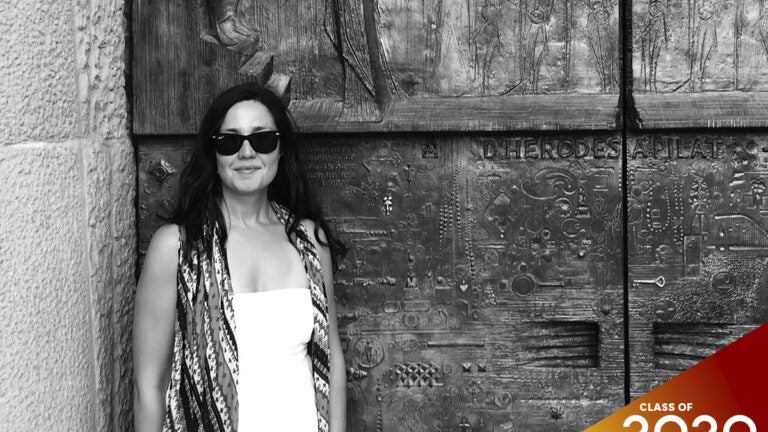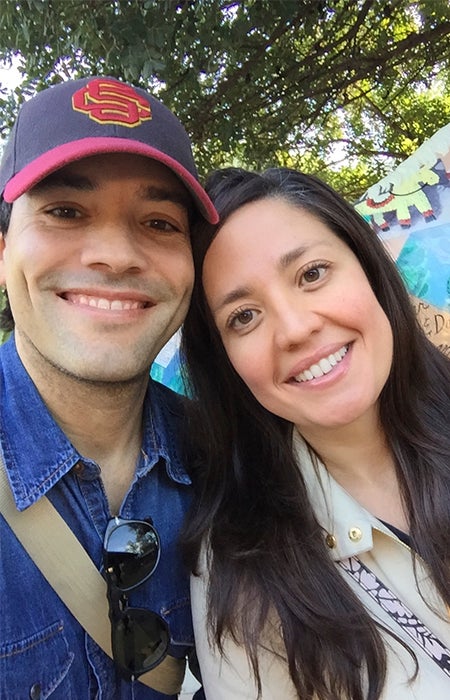
A writer finds her calling — and romance — at USC Dornsife
For many, the completion of such an exacting endeavor as a doctoral program might feel like a relief. For Catherine Theis, who graduates with her Ph.D. in creative writing from USC Dornsife College of Letters, Arts and Sciences on May 15, the end is bitter sweet.
“I don’t know if I want to give this all up,” Theis says. “I know it’s time to move on, but I’m coming to terms with the ending of something, which is always hard.”
It’s not surprising Theis feels a little reluctant to depart campus life. At USC Dornsife, Theis found the place she feels most at home.
“I really love the academic community,” she says. “That was the life force that I was missing in my earlier life before USC. Being around people, young people especially, who are so energized and who have so many ideas and who are outspoken.”
While at USC, she’s written poems, nonfiction and a play, Medea, a retelling of the ancient Greek tragedy, for which she was a finalist for the Leslie Scalapino Award for Innovative Women Performance Writers.
She also found her husband at USC Dornsife.
“It was one of those things I had been struggling for so long to find. I kept on asking my mom, ‘Why can’t I meet somebody who’s just like me?’ I know she prayed to a lot of patron saints for me.”
Days of heaven
A future as a poet is not too surprising for Theis, considering her rather romantic upbringing. Theis’ father, a lawyer, met her Italian mother at Louisiana State University. Her mother was due to head back to Sicily after completing her graduate studies. Instead, the couple married and remained in the United States — but under one condition.
“When my father asked my grandfather for my mom’s hand,” recounts Theis, “my grandfather said yes, but he said, ‘As soon as you have children, they have to spend every summer visiting us.’”
So, every June, the family headed to Aci Castello, a small town on the Mediterranean coast of Sicily. Remains of the 11th-century Norman castle from which the town derives its name still jut over the blue waters. The family’s days took on a languorous routine.
“We would go to the beach every morning and swim until lunchtime,” says Theis. “Then we would meet my grandparents at their house for lunch. We would take the traditional afternoon nap. After that we’d go out in the nighttime to the piazza for gelato.”
Theis’ love for lively conversation perhaps started at her grandfather’s “office,” where he and friends met nightly to socialize.
“He and his friends called it the office, but it wasn’t really an office, it was just stone benches built into the side of the mountain where there was a little figure of Mary. They would all smoke cigarettes. My grandfather would say, ‘These are my American grandchildren,’ and we would say ‘hello’ and then they would carry on talking,” says Theis.
The writer’s route
A bilingual upbringing also shaped her writer’s voice. “I grew up half in my mother’s world and half in my American family,” she says. “Italian was my first language, and I acquired her playfulness with language, her syntax. Learning English shaped my sensibility as a poet.”

Aaron Minas and Catherine Theis.
Theis points to school days in America as the beginning of her interest in playwriting. “At a small Catholic school, you’re required to participate in everything. You have to be an altar server, you have to be on the basketball team (even though you don’t like basketball). I think that helped me to think about collaborating, being in concert with one another.”
After high school, she headed to the University of Vermont, where she graduated with a degree in English and a minor in Italian. She received a master’s degree in poetry from the Iowa Writer’s Workshop. Then, she put creative writing on pause for a spell, taking a job in marketing for CVS Pharmacy, where poetry was rare.
“I think I was suppressing part of my true self. Nobody where I worked knew that I was a poet. I’ve always tried to suppress my poet’s sensibility, but I just haven’t been able to do it,” she explains.
After years in the corporate field, she began applying for Ph.D. programs. “I was dying to be around artists and writers and poets.”
USC was one of the schools she knew she’d commit to right away if she was accepted. A return to Italy that year may have pushed the Fates in her favor.
“I was traveling in Rome in early February,” she says, “and I remember going to a little church there and saying a prayer: ‘Please let me get into USC.’ Then, in late February, I got the call from USC. It was like magic.”
Campus connections both academic and romantic
Once on campus she thrived. She took a class with Susan McCabe, professor of English, on modernist writers. “I always find that time period very compelling because all the artists are working their way through the trauma of war,” says Theis.
She became particularly interested in the poet and novelist Hilda Doolittle (H.D.), who also shared her love for theatre and performance. This grew into Theis’ dissertation, which examines Doolittle’s translations and interpretations of classical Greek tragedies in the midst of emerging modernism.
In her third year at USC, she was invited to a welcome dinner for prospective doctoral students. It was there that she met the man she would marry, Aaron Minas.
She almost didn’t attend. (“It was a Tuesday night, I had taught that day and I live far from campus.”) But, determined to pay forward the kindness she’d received on her own academic journey, she went.
“I saw him, and his smile, and I just went over there and said, ‘Hi, I’m Catherine.’ And he said, ‘Hi,’ and then we just proceeded to talk for the rest of the night.” The two were married in 2017.
Writing in lockdown
Graduating in the midst of a pandemic presents less than ideal circumstances for determining next steps, but Theis is clear on her preferred future after her time at USC Dornsife.
“I would love to teach. I’ve taught four or five different literature classes at USC, and each year I’m just amazed at the level of engagement with the students and how smart and creative and dynamic they are.”
Due to the stay-at-home orders, she and her husband find themselves in Tucson, Arizona, far from campus. “We took a trip in early March to visit his mother for a couple of days, and, lo and behold, we’ve been here two months.”
She’s made the best of her time in quarantine, tackling ongoing writing projects, and working a poem about the desert. “I’ve never written one about the desert, so I thought, ‘Write a desert poem that doesn’t have any mythology in it. Just really listen to what’s happening in the desert.’”
Theis is eager for a time when the world reopens, and folks can gather again for good conversation.
“Art and literature are all kind of wrapped around this idea of having a really great dinner party for me. My main goal is to do whatever I can to be in conversation with other people who care about literature and art.”